Ariane 5 flight VA260, carrying the Juice mission, is fully integrated and ready for rollout
Tuesday, 11 April 2023 16:49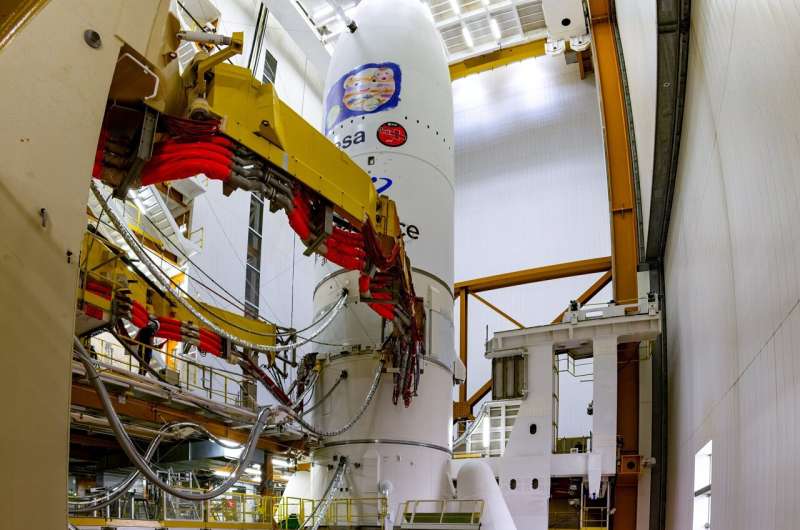
Ariane 5 for flight VA260 carrying ESA's Juice mission is seen here fully integrated and ready for rollout for its planned April 13, 2023 launch from Europe's Spaceport in French Guiana.
Juice—JUpiter ICy Moons Explorer—is humankind's next bold mission to the outer solar system. After an eight-year journey to Jupiter, it will make detailed observations of the gas giant and its three large ocean-bearing moons: Ganymede, Callisto and Europa.
This ambitious mission will characterize these moons with a powerful suite of remote sensing, geophysical and in situ instruments to discover more about these compelling destinations as potential habitats for past or present life. Juice will monitor Jupiter's complex magnetic, radiation and plasma environment in depth and its interplay with the moons, studying the Jupiter system as an archetype for gas giant systems across the universe.
Provided by European Space Agency
In booming satellite market, micro-rockets are the next big thing
Tuesday, 11 April 2023 13:08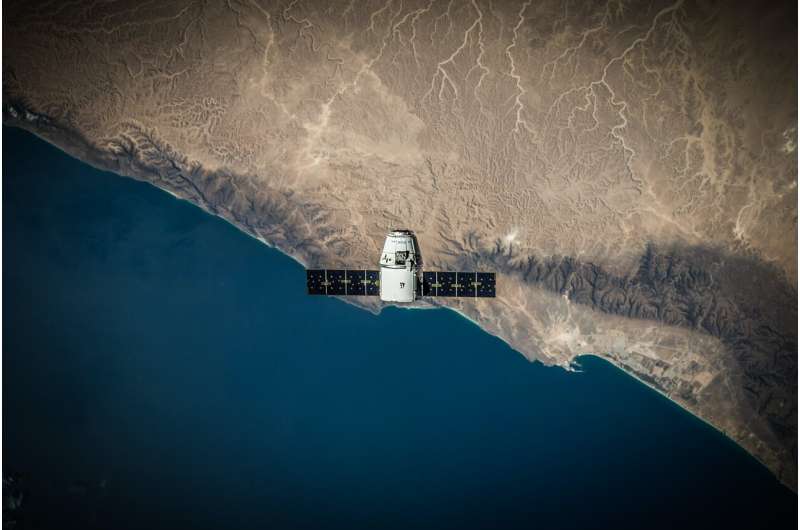
More and more miniature satellites are being launched every year, driving up demand for smaller rockets.
Contemporary life would hardly be possible without satellites. Much of what people do on Earth today relies heavily on what's happening high above their heads—from monitoring wildfires, deforestation and sea-surface temperatures to enabling connections to new mobile technologies like 5G in hard-to-reach areas.
A recent wave of cheaper, miniature satellites being sent into low orbits of 500 to 1,000 kilometers above Earth by the likes of Elon Musk's SpaceX and UK-based OneWeb signals a growing trend.
Less is more
With some tracking the globe's whole landmass and providing unprecedented detail, these satellites can be the size of a shoebox or even smaller.
Next O3b mPower satellites en route to launchpad
Tuesday, 11 April 2023 13:01
A second pair of O3b mPower satellites for upgrading SES’ medium Earth orbit broadband network are due to arrive at their SpaceX launchpad in Florida this week, Boeing announced April 11.
Op-ed | Practical applications of a space mission authorization framework
Tuesday, 11 April 2023 12:36
The National Space Council recently completed three public listening sessions on the issue of In-Space Authorization and Supervision, often described broadly as mission authorization.
Ball taps Loft and Microsoft for SDA NExT program
Tuesday, 11 April 2023 12:00
Ball Aerospace announced plans April 11 to work with Loft Federal and Microsoft’s Azure Orbital on the Space Development Agency’s National Defense Space Architecture Experimental Testbed program.
Virgin Orbit seeking expedited bankruptcy sale
Tuesday, 11 April 2023 10:57
Virgin Orbit is proposing a rapid sale of the company or its assets in bankruptcy, hoping to conclude the process before the end of May.
Ariane 5 flight VA260, Juice: fully integrated and ready for rollout
Tuesday, 11 April 2023 10:25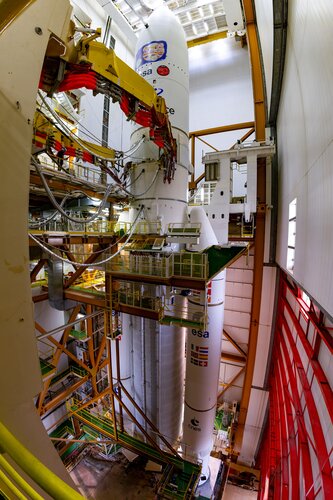 Image:
Ariane 5 flight VA260, Juice mission: fully integrated and ready for rollout at Europe's Spaceport in French Guiana
Image:
Ariane 5 flight VA260, Juice mission: fully integrated and ready for rollout at Europe's Spaceport in French Guiana S Korea to conduct 1st launch of commercial-grade satellite
Tuesday, 11 April 2023 10:21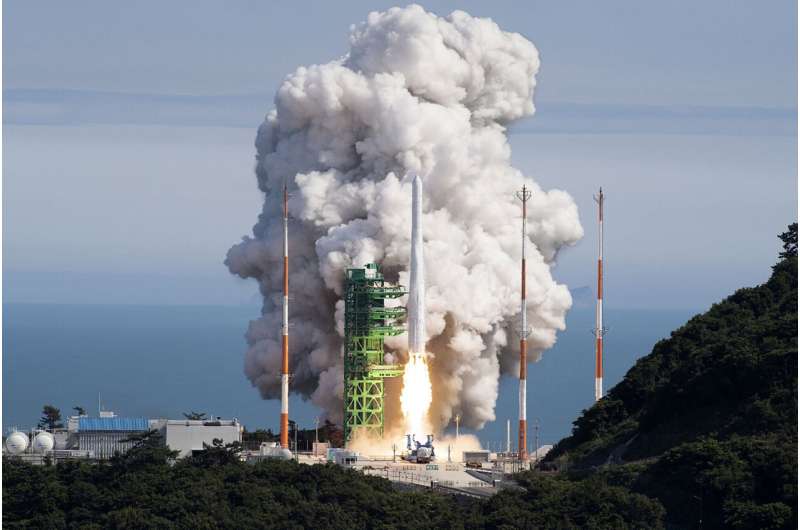
Rocket Lab shifts NASA cubesat launches from Virginia to New Zealand
Tuesday, 11 April 2023 10:12
Rocket Lab has shifted a pair of Electron launches of NASA storm-monitoring cubesats from Virginia to New Zealand, avoiding a potential conflict with another launch.
Juice: running on solar power in the dark
Tuesday, 11 April 2023 10:00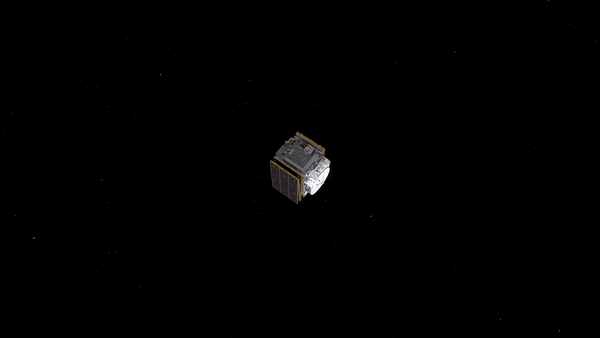
Welcome to Jupiter space: to one side looms the vast cloudy face of the largest planet in our Solar System; in the other appears a shrunken Sun, like a spotlight in the sky, with just 3% of the illumination from Earth orbit arriving here. This basic fact presented a major challenge to those planning ESA’s Jupiter Icy Moons Explorer, Juice, mission: how to make solar power work in such a gloomy environment, located an average 778 million km away from our parent star?
China to target asteroid 2019 VL5 for 2025 planetary defense test
Tuesday, 11 April 2023 09:13
China has selected near-Earth object 2019 VL5 for a combined asteroid deflection and observation test to launch 2025.
The post China to target asteroid 2019 VL5 for 2025 planetary defense test appeared first on SpaceNews.
NASA awards agreement for high-resolution synthetic aperture radar
Tuesday, 11 April 2023 06:39 NASA has awarded a sole source Blanket Purchase Agreement (BPA) to Capella Space Corporation of San Francisco to provide high-resolution Synthetic Aperture Radar (SAR) (0.5 meter to 1.2 meters) commercial Earth observation data products.
Under this agreement, the government will issue fixed-price BPA Calls for these products, at a not-to exceed value of $7 million per Call. The work will b
NASA has awarded a sole source Blanket Purchase Agreement (BPA) to Capella Space Corporation of San Francisco to provide high-resolution Synthetic Aperture Radar (SAR) (0.5 meter to 1.2 meters) commercial Earth observation data products.
Under this agreement, the government will issue fixed-price BPA Calls for these products, at a not-to exceed value of $7 million per Call. The work will b Was plate tectonics occurring when life first formed on Earth?
Tuesday, 11 April 2023 06:39 Earth is a dynamic and constantly changing planet. From the formation of mountains and oceans to the eruption of volcanoes, the surface of our planet is in a constant state of flux. At the heart of these changes lies the powerful force of plate tectonics-the movements of Earth's crustal plates. This fundamental process has shaped the current topography of our pla
Earth is a dynamic and constantly changing planet. From the formation of mountains and oceans to the eruption of volcanoes, the surface of our planet is in a constant state of flux. At the heart of these changes lies the powerful force of plate tectonics-the movements of Earth's crustal plates. This fundamental process has shaped the current topography of our pla Beneath the Earth, ancient ocean floor likely surrounds the core
Tuesday, 11 April 2023 06:39 Through global-scale seismic imaging of Earth's interior, research led by The University of Alabama revealed a layer between the core and the mantle that is likely a dense, yet thin, sunk ocean floor, according to results published in Science Advances.
Seen only in isolated patches previously, the latest data suggests this layer of ancient ocean floor may cover the core-mantle boundary. Su
Through global-scale seismic imaging of Earth's interior, research led by The University of Alabama revealed a layer between the core and the mantle that is likely a dense, yet thin, sunk ocean floor, according to results published in Science Advances.
Seen only in isolated patches previously, the latest data suggests this layer of ancient ocean floor may cover the core-mantle boundary. Su Guiding JUICE to Jupiter
Tuesday, 11 April 2023 02:43 This phenomenal endeavour, led by the European Space Agency, is powered by Airbus technology. Our engineers have rarely faced a greater challenge than enabling such a journey. The JUICE probe will encounter extreme temperatures, intense radiation and decreasing solar energy during its 5 billion kilometre journey. Being self-sufficient in energy generation and storage is key to the mission's succ
This phenomenal endeavour, led by the European Space Agency, is powered by Airbus technology. Our engineers have rarely faced a greater challenge than enabling such a journey. The JUICE probe will encounter extreme temperatures, intense radiation and decreasing solar energy during its 5 billion kilometre journey. Being self-sufficient in energy generation and storage is key to the mission's succ 
